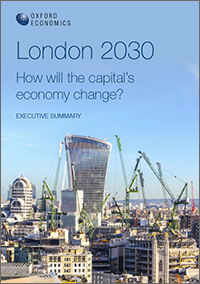Ungated Post | 15 May 2015
London 2030: How will the capital’s economy change?

London’s economy is growing strongly, easily outpacing both the UK and its nearest European rivals such as Paris and Frankfurt. Significant investments in public infrastructure, office buildings, retailing, and homes all point to widespread optimism that the growth will continue, not just for the next year or two but for many years to come. But how confident should we be about London’s growth trajectory?
London 2030 analyses the trajectory and magnitude of change that is likely to confront London’s economy in the decade and a half from 2015 up to 2030. The study is the result of analysis by our specialist cities forecasting team, and provides unrivalled forecast data sets and in-depth analysis of what trends imply for the scale and structure of the capital’s economy over the next fifteen years, as well as assessment of other factors that might influence growth.
The full research programme is now available for purchase, and is comprised of five research papers:
- Our baseline forecasts for London’s economy, population growth and employment to 2030
- A forecast comparison between our data and The London Plan
- Analysis of housing trends: will a shortage of housing constrain London’s growth?
- Assessment of the impact of alternate scenarios, such as a Eurozone crisis, or a stronger performance -Possible drivers of change such as the impact of new technology, or the UK leaving the EU
Oxford Economics’ team is expert at applying advanced economic tools that provide valuable insights into today’s most pressing business, financial, and policy issues.
To find out more about our capabilities, contact:
Americas
Diantha Redd
+1 (646) 503 3052
Email
Asia Pacific
Peter Suomi
+65 6850 0110
Email
EMEA
Aoife Pearson
+44 (0)203 910 8054
Email
Related Services

Post
The economic impact of abandoning the WTO
Oxford Economics have been commissioned by the International Chamber of Commerce (ICC) to provide an independent assessment of the economic impact of WTO dissolution. This report details our findings and the assumptions underpinning our analysis.
Find Out More
Post
The economic impact of the sports activities of public service media
This study shows how the sports activities of public service media supported €4.5 billion of GDP and 57,000 jobs across 31 European countries in 2022, taking direct, indirect (supply chain), and induced (wage-funded expenditure) impacts into account. The report also highlights wider economic benefits of public service media sports coverage, such as the way in which it leverages sponsorship income for sports bodies.
Find Out More
Post
Global Trade Education: The role of private philanthropy
Global trade can amplify economic development and poverty alleviation. Capable leaders are required to put in place enabling conditions for trade, but currently these skills are underprovided in developing countries. For philanthropists, investing in trade leadership talent through graduate-level scholarships is an opportunity to make meaningful contributions that can multiply and sustain global economic development.
Find Out More